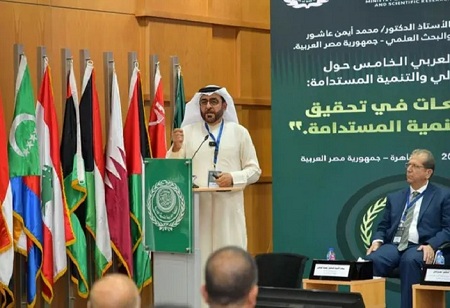The Arab Organization for Administrative Development, in collaboration with the Union of Arab Universities, recently hosted the Fifth Arab Conference on Higher Education and Sustainable Development, with the theme 'The Role of Universities in Achieving Sustainable Development Goals,' at its headquarters in Cairo, Egypt. The University's participation in this event is consistent with its efforts to strengthen collaborations and establish future partnerships with major Egyptian universities attending the conference. It also reflects HBMSU's commitment to expanding channels of cooperation and coordination with leading universities, educational institutions, and academic and research communities throughout the Arab world. HBMSU intends to share its experiences in establishing new standards for higher education quality and leveraging latest technological innovations to foster educational system transformation.
Mr. His Excellency The keynote speaker for the conference was Dr. Mansoor Al Awar, Chancellor of Hamdan bin Mohammed Smart University. He was joined at the event by Professor Mustafa Hassan, Vice-Chancellor of the University for International Cooperation. The conference was also attended by Dr. Ahmed bin Salem Al-Amri, President of Imam Muhammad bin Saud Islamic University, Professor Sharif Yousef Khatter, Director of Mansoura University, H.E Dr. Amr Adly, President of the Egyptian-Japanese University of Science and Technology, and H.E Professor Mohammed Alwadian, President of the Arab University of Amman.
"We are honored to attend the Fifth Arab Conference on Higher Education and Sustainable Development," said H.E. Dr. Mansoor Al Awar, Chancellor of Hamdan bin Mohammed Smart University. The conference provides an ideal platform for Arab universities to collaborate on developing an educational system that incorporates sustainable development into all programs and contexts, in order to empower our Arab national cadres and consolidate the role of universities as incubators for creativity and innovation, as well as drivers of long-term social and economic development. Without a doubt, today's rapid developments place additional responsibilities on the higher education system, requiring academic institutions to adopt innovative methodologies and expand their reliance on advanced technologies and their applications, promote joint university work, and so on consolidate innovation, and develop creativity among our young cadres as the future's pillars.”
Al-Awar spoke at the conference about the meaning of education and sustainable development, as well as HBMSU's proactive approach to improving educational quality. According to the United Nations, the inclusion of quality education is a basic need and a key pillar in building a peaceful and prosperous world as the first source of knowledge and skills to preserve individuals' health, ensure their professional opportunities, and establish positive values, the most important of which is tolerance. He also emphasized the connection between sustainable development and education. The fourth sustainable development goal is quality education, which is critical to achieving the core goal of sustainability, which is to meet today's demands without jeopardizing future generations' ability to meet their own.
H.E. Dr. Al Awar met with H.E. Dr. Nasser Al Qahtani, Director General of the Arab Administrative Development Organization, on the sidelines of the conference. Al Awar also met with Sheikh Dr. Ammar bin Nasser Al Mualla, the UAE's Attaché of Education and Science and Technology to the Arab Republic of Egypt, and the two discussed the prospects for educational advancement and promoting collaboration to support educational sustainability. The Arab Organization for Administrative Development, one of the Arab League's specialized entities, organizes the Arab Conference on Higher Education and Sustainable Development. The organization was established in 1961 to assist Arab countries in achieving administrative growth and addressing concerns about overall development.

